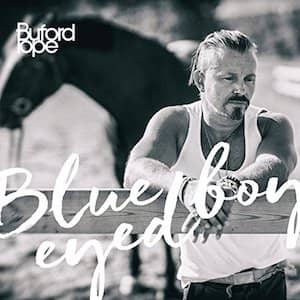 Buford Pope: Blue-eyed Boy
Buford Pope: Blue-eyed Boy
Unchained Records – 22 Septemeber 2017
From the name you might expect some drawling Southern boy, but, in fact, Pope (whose real name is Mikael Liljeborg) hails from Sweden where he’s made a notable impact on the homegrown Americana scene, the waves of which have increasingly rippled across to Europe and the USA.
Blue-eyed Boy is his seventh album and, if you’ve not heard him before, then the high pitched but raspy voice might take you by surprise, often sounding like some Southern female country singer, most notably the younger Lucinda Williams, particularly so on the lost love reflections of Ribbons In Her Hair.
That said, however, Don’t Lay A Hand On Him, sung in the voice of a father pleading parental neglect in defence of his killer son with Pope adding banjo and piano to his acoustic guitar, evokes The Band. Indeed Bloodline has a vocal delivery and melody line heavily reminiscent of their version of I Shall Be Released.
Working with instrumentation that features fiddle, accordion and plentiful pedal steel, save for the fiddle swirling ‘lovers on the run’ number The Baltic Sea and the dark-veined train rhythmed Infirmary (“I wanna leave, but death seems to miss this room”), the tempo throughout is measured in ballad strokes.
Many of the songs have been hanging around for up to ten years, looking for the right moment, the right approach. Here, that being raw, one-take recordings that mine the emotional depths of the lyrics that address themes of loss, searching and bruised hearts and souls with lines like “I was born with a one-way ticket in my hand” (No Man’s Land) or “I learned to dwell with the pain. I wanted the rainbow, but all I had was the rain” (the mournful waltzing Someone).
Echoing Nebraska perhaps, hard times percolate the narratives of things like the Appalachian mandolin flavoured Hard Land with Judith Fritz on harmonies and the Dylan-toned, fiddle stained Freewheeling, a song about escape in drinking and a resigned acceptance that it’s too late for healing that comes with an unexpectedly buoyant chorus refrain.
Using alcohol to numb the pain also informs the closing number, the old time rustic American of Visbyville, Louise Bylund on key harp and Roget Gustafson on dobro for an achingly lovely leaving song about guilt, regret and atonement.
First class throughout, it may be three years since he recorded any new material, but if he’s got any more like this in the archive, there’ll be no complaints if he decides to dust off a few more.

